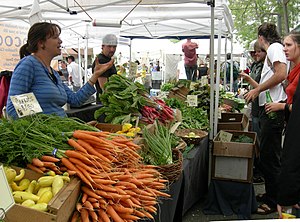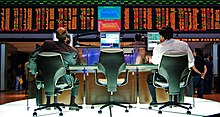
Back Ekonomie Afrikaans Wirtschaftswissenschaft ALS ሥነ ንዋይ Amharic Economía AN اقتصاد (علم) Arabic ܝܘܠܦܢ ܡܡܫܚܘܬܐ ARC إيكونومي ARY অৰ্থনীতি Assamese Economía AST Экономика AV



Economics is the social science which studies economic activity: how people make choices to get what they want. It has been defined as "the study of scarcity and choice" and is basically about the choices people make. It also studies what affects the production, distribution and consumption of goods and services in an economy.[1]
Investment and income relate to economics.[2] The word comes from Ancient Greek, and relates to οἶκος oíkos "house" and νόμος nomos "custom" or "law".[3] The models used in economics today were mostly started in the 19th century. People took ideas from political economy and added to them because they wanted to use an empirical approach similar to the one used in the natural sciences.[4]
- ↑ Krugman, Paul; Wells, Robin (2012). Economics (3rd ed.). Worth Publishers. p. 2. ISBN 978-1464128738.
- ↑ Krugman, Paul; Robin Wells (2012) Microeconomics: Second Edition in Modules Worth Publishers page 2
- ↑ Harper, Douglas (November 2001). "Online Etymology Dictionary — Economy". Retrieved October 27, 2007.
- ↑ Clark, B. (1998). Political-economy: A comparative approach. Westport, CT: Preager.
